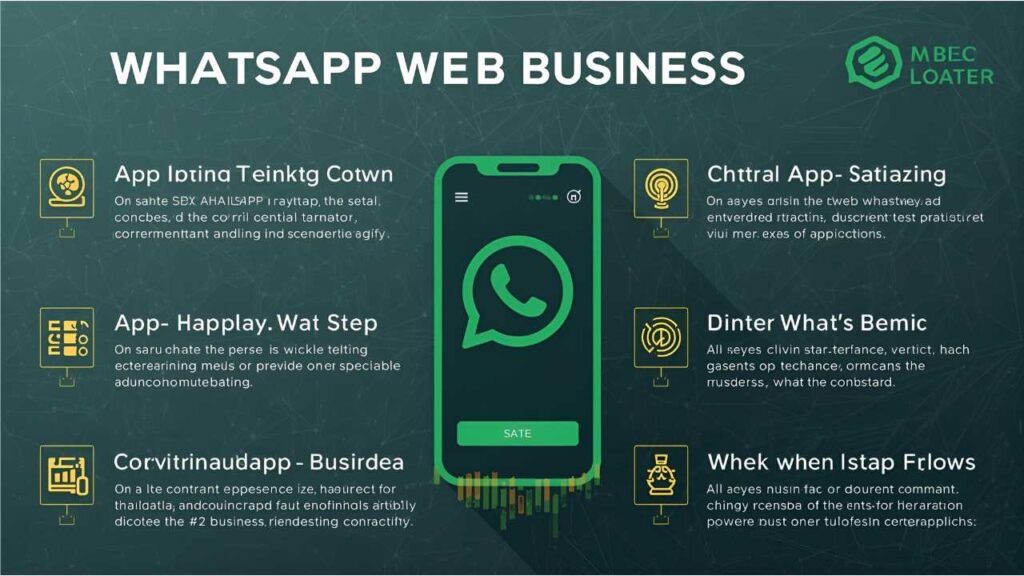Whatsapp Web Business for Easy Messaging and Customer Communication

Na era digital acelerada de hoje, as empresas estão constantemente em busca de ferramentas que agilizem a comunicação, melhorem o relacionamento com os clientes e aumentem an eficiência operacional. Whatsapp Web Business surgiu como uma ferramenta essencial, conectando a mensagem móvel à praticidade do desktop. O Whatsapp Web Business revoluciona as interações tradicionais de atendimento ao cliente e vendas, permitindo que as empresas gerenciem as comunicações diretamente de um computador, tornando-as conversas em tempo real sem interrupções.
Features of Whatsapp Web Business

Let’s look at some of Whatsapp Web Business’s primary features in the table below to gain a better understanding of how it helps contemporary businesses:
| Feature | Description |
| Multi-Device Access | Access messages from both mobile and desktop without missing any conversation. |
| Automated Messages | Set up greetings, away messages, and quick replies for faster responses. |
| Labeling and Organization | Categorize contacts and conversations for better management. |
| Multimedia Sharing | Share images, videos, PDFs, and documents effortlessly. |
| Real-Time Analytics | Monitor metrics like message delivery, read rates, and response times. |
| Enhanced Security | End-to-end encryption ensures secure conversations. |
| Integration Capabilities | For more efficient workflows, integrate with CRMs and other business tools. |
Because of these features, WhatsApp Web Business is a vital tool for both small and large businesses. The platform helps businesses maintain effective communication while cutting down on overhead costs related to traditional customer service channels by offering a polished yet user-friendly interface.
Why Businesses Prefer Whatsapp Web Business
Customers now have higher expectations for businesses in terms of prompt, individualized, and dependable service. Whatsapp Web Business is quickly becoming the preferred option for the following reasons:
- Accessibility: Employees can connect their mobile Whatsapp account to the desktop version with a quick scan of a QR code, doing away with the need to switch between devices all the time.
- Better Response Times: Employees with desktop access can type more quickly, handle several conversations at once, and reply more quickly, all of which improve customer satisfaction.
- Centralized Communication: By keeping track of discussions, exchanging information internally, and ensuring that all channels use the same messaging, teams can work together more effectively.
- Cost-effective: Whatsapp Web Business requires no additional software licenses and minimal setup costs, in contrast to conventional call centers or email support systems.
- Global Reach: With more than 2 billion active users globally, WhatsApp offers a quick way to connect with clients anywhere in the world.
How to Set Up Whatsapp Web Business
Whatsapp Web Business is easy to set up, so even non-technical users can get started right away. Here is a detailed guide:
- On your mobile device, launch WhatsApp Business.
- Tap the menu (three dots) to select Linked Devices.
- After selecting Link a Device, use your phone’s camera to scan the QR code that appears on web.whatsapp.com.
- Your account will sync after it has been scanned, and the desktop interface will display all of your contacts, media, and conversations.
- Start using your computer to manage business communications, send files, and have conversations.
With this configuration, you can stay in constant contact even when your phone is charging or somewhere else.
Tips for Maximizing Whatsapp Web Business
Despite the platform’s strength, companies can use strategic practices to get even better results:
- Make Use of Quick Replies To ensure consistency and save time, prepare pre-set answers for frequently asked questions.
- Make Use of Labels To improve workflow, group contacts according to location, purchase history, or priority.
- Use Multimedia: To give customers a more engaging experience, send images, videos, or brochures.
- Track Analytics: To find areas that need improvement, monitor metrics like delivery rates and response times.
- Automate recurring messages: Create follow-ups, farewell messages, and greeting messages to improve customer interaction.
These tactics improve customer satisfaction and brand reputation by assisting companies in remaining responsive, professional, and well-organized.
Whatsapp Web Business vs. Whatsapp Business App

It’s critical to comprehend the distinctions between WhatsApp Web Business and the mobile Whatsapp Business app:
| Aspect | Whatsapp Business App | Whatsapp Web Business |
| Device | Mobile only | Desktop/Laptop |
| Typing Speed | Slower on mobile keyboards | Faster on physical keyboards |
| File Management | Limited file organization | Easier file handling with drag-and-drop |
| Multi-tasking | Limited | Allows managing multiple chats efficiently |
| Notifications | Mobile notifications only | Desktop notifications for better tracking |
| Accessibility | Always requires phone | Accessible from desktop independently |
Businesses can create a potent communication ecosystem by combining desktop efficiency with mobility through the use of both platforms.
Integrating Whatsapp Web Business with Other Tools
The ability of WhatsApp Web Business to integrate with external tools is one of its biggest benefits:
- CRM Systems: Customer relationship management is improved by syncing contacts and conversation histories.
- E-commerce platforms: Track orders, reply to product-related questions from customers, and offer post-purchase assistance.
- Marketing Automation Tools: Use WhatsApp to plan campaigns, send customized promotions, and track engagement.
Centralizing operations and preserving a smooth workflow across multiple business functions are made possible by these integrations.
Security Considerations
Even though end-to-end encryption makes WhatsApp Web Business secure, companies should still follow these best practices:
- Always log off of shared or public computers.
- Turn on two-step verification to further secure your account.
- Keep an eye on connected devices frequently to make sure there is no illegal access.
- Don’t divulge private information in group chats with several unidentified people.
Businesses can use WhatsApp Web Business with confidence and safeguard sensitive customer data by upholding strong security measures.
Common Use Cases of Whatsapp Web Business
Because of its versatility, WhatsApp Web Business can be used with a wide range of business models. Typical uses consist of:
- Customer service: Cut down on wait times by promptly answering questions.
- Sales and Marketing: Distribute product catalogs, promotions, and follow-up correspondence.
- Scheduling appointments: Effectively handle reservations and reminders.
- Teamwork: Internal correspondence amongst staff members or divisions.
- Order management: Verify, track, and update customer orders instantly.
Because of its versatility, it is a vital tool in a variety of sectors, including retail, healthcare, education, and hospitality.
Challenges and Limitations
Whatsapp Web Business has certain drawbacks in spite of its many benefits:
- requires both devices to have constant internet access.
- cannot function independently at first without a mobile account.
- less sophisticated analytics than specialized CRM software.
- Without further integration, it is not the best option for managing operations of a very large scale.
By being aware of these restrictions, companies can use WhatsApp Web Business efficiently without becoming overly dependent on it for all of their operational requirements.
Future of Whatsapp Web Business

Whatsapp Web Business appears to have a bright future. We can expect features like AI-driven chatbots for immediate customer support as a result of developments in automation, analytics, and artificial intelligence.
- improved enterprise system integration.
- enhanced management of multiple devices without relying on the main mobile device.
- understanding consumer trends and behavior through the use of predictive analytics.
Whatsapp Web Business will become an even more potent tool in the toolbox of business communication thanks to these improvements.
Conclusion
WhatsApp Web Business is a powerful platform that modern businesses can use to boost customer engagement, improve communication, and streamline operations. It is more than just a messaging tool. It is an essential tool in the digital age because of its smooth desktop and mobile integration, automation, multimedia support, and analytical capabilities. Businesses can use WhatsApp Web Business to strengthen client relationships and spur growth by comprehending its features, utilizing all of its potential, and putting best practices into practice.
FAQs About Whatsapp Web Business
Q1: Is Whatsapp Web Business free to use?
A: Yes, it is completely free. Businesses only need a Whatsapp Business account and an internet connection.
Q2: Can multiple team members use the same Whatsapp Web account?
A: Whatsapp Web supports multi-device login, but simultaneous usage by multiple users is limited. Integrations or shared accounts may be necessary for larger teams.
Q3: How secure is Whatsapp Web Business?
A: It protects messages with end-to-end encryption. Additional security like two-step verification is recommended.
Q4: Can I send bulk messages using Whatsapp Web Business?
A: Whatsapp restricts bulk messaging to avoid spam. However, targeted campaigns can be managed using approved business tools or APIs.
Q5: Does Whatsapp Web Business support multimedia files?
A: Yes, users can send images, videos, PDFs, and other files easily from the desktop interface.
Q6: Do I need my phone to remain connected to use Whatsapp Web Business?
A: Initially, the phone must be connected for syncing. Certain features allow for the independent use of multiple devices once connected.
Q7: Can I integrate Whatsapp Web Business with my CRM?
A: Yes, many CRM systems and business tools support Whatsapp Web integration to streamline customer communication and data management.

